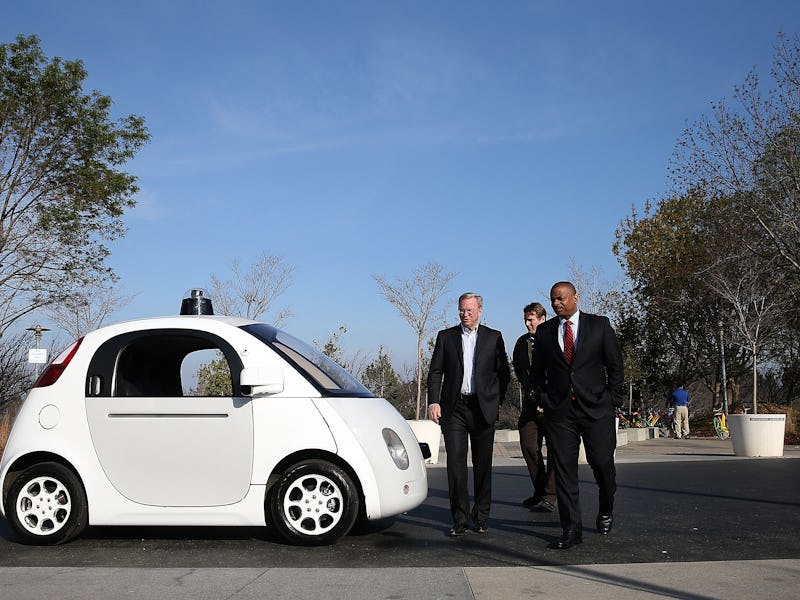Why Not Treat Self-Driving Cars Like the FAA Does Airplanes?
How Government is working to ensure consumer safety without stifling innovation.

Domestic automakers, namely Google, are racing to capture the driverless car market and they face pressures from existing laws, consumer trust, and foreign competition, all of which could put U.S. companies in the rearview.
That’s a scenario representatives from Google, General Motors, Lyft, Delphi Automotive, and Duke University were trying to prevent on Tuesday during a hearing before the Senate Commerce Committee titled “Hands Off: The Future of Self-Driving Cars.”
Often, technology evolves faster than the laws put in place to regulate the industry: Bullet trains, modernizing mass transit, and creating interconnected public wifi networks are the examples that always seem to sprout up in local media across the country.
Which is why Mary Cummings, director of the Humans and Autonomy Lab and Duke Robotics at Duke University, is calling for more comprehensive guidelines, maybe a framework similar to the Federal Aviation Administration’s aircraft regulations.
“There are many unknowns that these systems will encounter, but there are also many known-knowns in self-driving cars that we are aware of but are not being openly tested in a principled and rigorous manner that would be expected in similar transportation settings,” Cummings told Congress on Tuesday, offering her own Donald Rumsfeld impression. “For example, the FAA has clear certification processes for aircraft software, and we would never let commercial aircraft execute automatic landings without verifiable test evidence approved by the FAA.”
Cummings says how to solve for poor performance of sensors in bad weather, an inability to follow traffic director hand signals, pranksters physically commandeering the vehicles, and hackers taking control of cars are all questions that should be answered.
John Thune, a Republican congressman from South Dakota and chairman of the Senate committee on commerce, appeared almost giddy during Tuesday’s Senate hearing after testing a Google self-driving car, but said he’d approach it “with an eye towards safety.”
Cummings says these sorts of demonstrations are “substituted for principle testing,” and need to be held to a higher standard.
“People want to be pro-innovation and pro-jobs,” Cummings tells Inverse. “I’m pro all of those things, too, but I don’t think we’ve set up a structure to guarantee safety yet.”
Whereas U.S. automakers seem concerned over potential future regulatory disadvantages in their competition with other countries, Cummings notes that while countries such as Germany are “exemplary in this space,” they have the same hurdles to climb as the U.S.-based firms.
Fostering innovation and protecting consumer safety has proven to be a narrow slice of the Venn diagram.
“There is no question that someone is going to die using this technology. The question is when,” Cummings said at the hearing, echoing comments made by Google’s Chris Urmson at South by Southwest on March 11, when he said Google is going to have “worse days” than the highly publicized Valentine’s Day fender bender in California.
“If a death were to occur at the wrong time, it could really set back the future of the technology,” Cummings says. “We want the safety testing data out there so that the accident that could have been prevented does not happen.”
Democratic members at the hearing similarly voiced the need for minimum standards of safety and regulation.
“We must exercise responsible oversight by asking the tough questions today to make sure these cars of tomorrow are safe for the public,” Senator Bill Nelson of Florida said. “As we have seen with both the Takata airbag crisis and the GM ignition switch recall, individual components of vehicles with defects can snowball into big problems.”
.S. Transportation Secretary Anthony Foxx (L) and Google Chairman Eric Schmidt (R) inspect a Google self-driving car at the Google headquarters.
Companies like Google are worried about competition from China, where automakers such as Baidu Inc. are quickly developing capable artificial intelligence, even if the basic components of the car such as engines aren’t comparable to U.S. makers, says Wang Jing, Baidu Inc.’s senior vice-president of autonomous vehicles.
In 2011, when Google was first testing a highway-capable Prius, China’s National University of Defense Technology managed to copy the feat with its own Hongqi HQ3 taking the streets autonomously. In December Baidu proved it’s a real contender in this sector when it modified a BMW 3-Series to navigate an 18.6-mile trek through highways and dense city streets all on its own.
Innovations like these have made some at Google worried, not about the company’s capabilities to match or outpace their competition, but whether the U.S. government will be permissive of this soon-to-emerge technology.
In October, Tesla introduced Autopilot in its cars that gets consumers part way to full autonomous driving, and CEO Elon Musk says its cars will fully be able to drive themselves in two years. Uber and Lyft, which had representatives at the hearing, are betting their own ride-sharing autonomous vehicles will dominate the market.
Democratic Senators Ed Markey of Massachusetts and Richard Blumenthal of Connecticut pressured all four automakers to say whether or not they would accept minimum standards to regulate this new market, and no one was able to give a strict answer.
Urmson said in the hearing that he’s concerned with differing rules across state lines, an area the government could really step in and help.
“In the past two years, 23 states have introduced 53 pieces of legislation that affect autonomous vehicles — all of which include different approaches and concepts,” he said. “If every state is left to go its own way, it would be extremely impractical to operate an autonomous vehicle across state boundaries.”